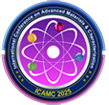

ICAMC 2025 ensures the quality, relevance, and originality of papers submitted/received for publication in conference proceedings/Journal publications. These policies typically involve peer review, where experts in the field evaluate submissions based on predefined criteria. The specific review process, including single, double-blind, or panel review, varies by ICAMC2025 editors and other publishers. The goal is to identify papers that meet the ICAMC 2025 scope, are of high scientific standard, and offer a significant contribution to the field of Materials science.
Quality and Relevance:
Reviewers should be experts in the relevant field with the ability to assess the quality and significance of the research.
Reviewers assess whether the paper meets the standards of the conference proceedings and its target audience, ensuring it's relevant to the ICAMC 2025 theme, sub-themes, and various fields
Originality and Novelty:
Reviewers look for original research, new methods, or significant improvements in existing approaches towards innovation and product development.
Scientific Validity:
Papers are evaluated for the soundness of their aim, methods, data analysis, and conclusions
Clarity and Communication:
Reviewers assess whether the paper is well-written, easy to understand, and communicates its findings or originality.
Ethical Considerations:
Reviewers ensure that the paper adheres to ethical guidelines, including proper citation and avoiding plagiarism.
Single-blind vs. Double-blind:
ICAMC 2025 uses single-blind peer review, where the authors know the reviewers but not vice versa, while others employ double-blind peer review, where both author and reviewer identities are unknown.
Panel Review:
ICAMC 2025 utilizes panels of experts who collectively evaluate submissions, often based on abstracts or scores relative to other submissions.
Multiple Rounds:
ICAMC 2025 may involve multiple rounds of review, with revisions requested based on reviewer and guest editor feedback.
Timeframe:
ICAMC 2025 review processes typically have a defined timeframe for submissions and decisions, ensuring a timely publication schedule.
Constructive Feedback: Reviewers are expected to provide detailed and constructive feedback, highlighting the strengths and weaknesses of the paper.
Confidentiality: Reviewers must maintain confidentiality, safeguarding the author's work and keeping their identity from the authors.
Objectivity and Fairness: Reviewers should evaluate papers impartially, avoiding bias or prejudice.
Timeliness: Reviewers are expected to complete reviews within the allotted timeframe.
Reporting Ethical Issues: Reviewers should alert the conference chair to any suspected ethical misconduct
Typically, papers are reviewed by multiple reviewers, and the program committee or editor makes a decision based on the reviews.
Accept: The paper is accepted for publication without further revisions.
Accept with minor revisions: The paper is accepted after the author makes the requested revisions based on reviewer feedback.
Reject: The paper is rejected for publication, and authors may be advised to resubmit to another publication.
Review Form: ICAMC 2025 Conference committees often provide reviewers with a standardized review form to guide their assessment and ensure consistency.
Guidelines: Reviewers receive guidelines that specify the criteria for evaluating papers and provide a framework for providing feedback.
Ethical Aspects: Policies address ethical issues such as plagiarism, data fabrication, and conflicts of interest
Conflict of Interest: Reviewers should disclose any conflicts of interest that could affect their objectivity.
Confidentiality: Reviewers must maintain the confidentiality of submitted papers. Reviewers are obligated to maintain the confidentiality of both the paper and the review process.
Plagiarism: Reviewers should be vigilant for plagiarism and report any suspected instances.